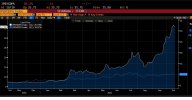Burger_King
FULL MEMBER

- Joined
- Jul 18, 2014
- Messages
- 162
- Reaction score
- 0
- Country
- Location
According to some historians, one reason we are communicating in English rather than in French is that the English government could rely on bond markets to fund budget deficit which arose due to war spending. In comparison, Napoleon was actually hostile to moneyed interest and thus could only rely on tax revenue for defense spending which was not enough to counter resources deployed by the English
Liz Truss' government was bought down in record time due to hostile reaction of bond markets on government's mini-budget. The UK bond selloff caused a spike in interest rates which in turn would have a highly adverse impact on UK's economy.
By a strange coincidence, we have seen similar development in Pakistan's external debt market that we have seen in UK recently.
Until early March, average yield on Pakistan's external debt was flat to that of Turkish debt. Turkey's credit rating is higher than that of Pakistan's rating so in theory, Pakistan's debt would have to yield higher to compensate investors for the risk of investing in Pakistan. Yet yield on Pak bond was around the same level to Turkish debt which was a sign of confidence on IK's economic policy.
Things were going relatively well for Pakistan until early March when there was a sudden spike in yields on government bonds. So what happened in early March? That was when news of no confidence motion came out which caused investors to run for the hills much in the same way that UK bond investors did when they heard details of Truss mini budget.
Since UK establishment is smart along with being loyal to the country, they got rid of dangerous Truss government. In comparison, our establishment doubled down and appointed Dollar Dar which scared investors even more and now Pakistan is being discussed as a likely candidate for bankruptcy.
So question is not why we are not talking in French or English? Rather question is why we are not communicating in our maadri zubaan i.e. Urdu. Development in UK and the graph below sheds a light on the issue.
In the graph below, white line shows avg yield on Pakistan dollar debt while blue line shows yield on Turkish dollar debt.
Liz Truss' government was bought down in record time due to hostile reaction of bond markets on government's mini-budget. The UK bond selloff caused a spike in interest rates which in turn would have a highly adverse impact on UK's economy.
By a strange coincidence, we have seen similar development in Pakistan's external debt market that we have seen in UK recently.
Until early March, average yield on Pakistan's external debt was flat to that of Turkish debt. Turkey's credit rating is higher than that of Pakistan's rating so in theory, Pakistan's debt would have to yield higher to compensate investors for the risk of investing in Pakistan. Yet yield on Pak bond was around the same level to Turkish debt which was a sign of confidence on IK's economic policy.
Things were going relatively well for Pakistan until early March when there was a sudden spike in yields on government bonds. So what happened in early March? That was when news of no confidence motion came out which caused investors to run for the hills much in the same way that UK bond investors did when they heard details of Truss mini budget.
Since UK establishment is smart along with being loyal to the country, they got rid of dangerous Truss government. In comparison, our establishment doubled down and appointed Dollar Dar which scared investors even more and now Pakistan is being discussed as a likely candidate for bankruptcy.
So question is not why we are not talking in French or English? Rather question is why we are not communicating in our maadri zubaan i.e. Urdu. Development in UK and the graph below sheds a light on the issue.
In the graph below, white line shows avg yield on Pakistan dollar debt while blue line shows yield on Turkish dollar debt.




